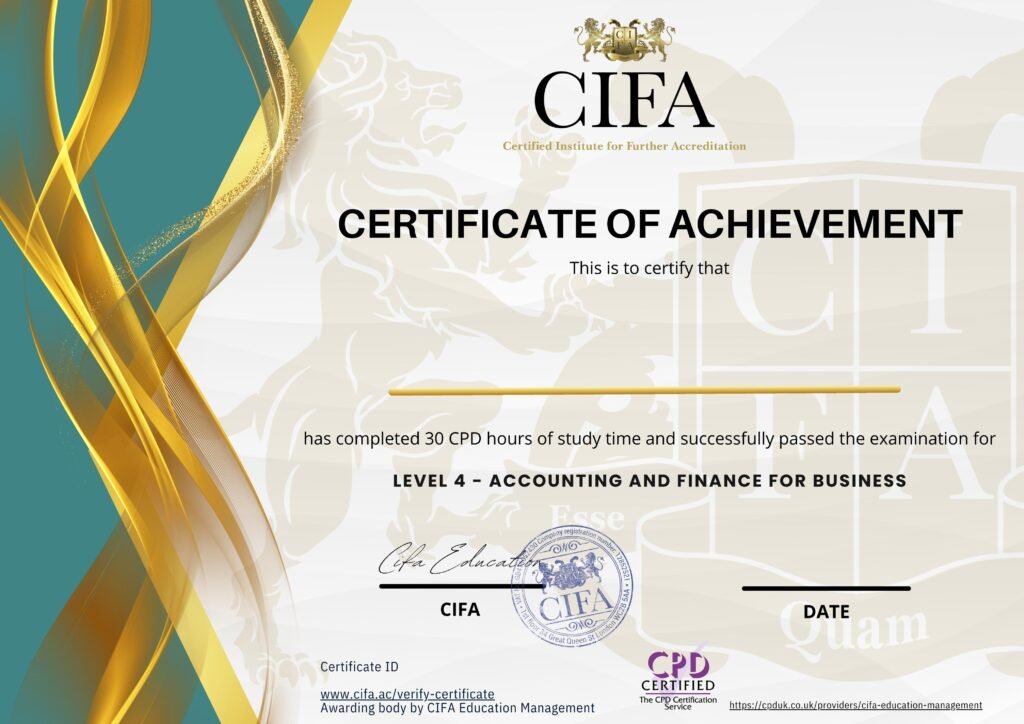By CIFA – Chartered Institute for Financial Accountants
In today’s evolving regulatory landscape, businesses of all sizes must operate with financial transparency, ethical standards, and legal accountability. These requirements form the foundation of compliance and accountancy—two pillars essential to sustainable business success. The Chartered Institute for Financial Accountants (CIFA) proudly offers the “Introduction to Compliance and Accountancy for Business” course, a comprehensive program designed to build foundational knowledge in financial practices, reporting, and regulatory compliance.
This course is ideal for business professionals, entrepreneurs, junior accountants, and students who need to understand how financial accountability and legal compliance intersect to support responsible business conduct. With the increasing demand for corporate governance, anti-fraud measures, and fiscal responsibility, there has never been a more critical time to gain proficiency in compliance and accountancy. Guest-post
Why Choose CIFA?
As a leading provider of financial and business education, CIFA is known globally for its commitment to delivering accessible, accredited training programs that combine academic quality with practical relevance. CIFA’s mission is to prepare individuals with the skills and knowledge necessary to operate effectively in today’s global business environment.
With professional recognition and CPD (Continuing Professional Development) accreditation, CIFA certifications add tangible value to your career while helping organizations maintain financial integrity and compliance with legal obligations.
Course Overview
The Introduction to Compliance and Accountancy for Business course from CIFA is structured to provide learners with a robust understanding of:
-
Core accounting principles and financial statements
-
Regulatory compliance and corporate governance
-
Financial ethics, fraud prevention, and risk management
-
Taxation fundamentals and audit preparation
-
The role of accountants in legal compliance and strategy
This beginner-friendly course is designed with real-world case studies, scenario-based assessments, and interactive materials to make learning both engaging and applicable.
What You’ll Learn
1. Fundamentals of Accounting
Participants begin by exploring the foundations of financial accounting, including the purpose of bookkeeping and the structure of the three key financial statements:
-
Income Statement: Tracking revenue and expenses
-
Balance Sheet: Snapshot of a company’s assets, liabilities, and equity
-
Cash Flow Statement: Monitoring liquidity and operational cash
The course covers double-entry bookkeeping, trial balances, journal entries, ledgers, and the accounting equation. You will learn how these principles are applied to real business transactions and how errors can impact decision-making and reporting.
2. Regulatory Compliance Basics
Compliance refers to the act of following rules, laws, standards, and ethical practices set forth by government authorities and industry regulators. In this module, learners are introduced to:
-
Key regulatory bodies (e.g., HMRC, SEC, FCA, etc.)
-
International Financial Reporting Standards (IFRS)
-
Anti-money laundering (AML) regulations
-
Data protection laws (e.g., GDPR)
-
Sarbanes-Oxley Act and internal controls
You’ll gain insight into how businesses implement compliance policies, conduct internal audits, and create a “culture of compliance” that protects stakeholders and reduces legal risk.
3. Ethics in Finance
CIFA places a strong emphasis on professional ethics. This unit explores:
-
The role of ethics in accounting and compliance
-
Conflict of interest scenarios
-
Whistleblower protection
-
Fraud detection and reporting obligations
You will learn how to identify red flags and apply ethical reasoning to complex financial situations. This training is particularly relevant for those considering careers in internal auditing, financial oversight, or forensic accounting.
4. Taxation and Reporting
A key component of compliance is accurate and timely reporting of taxes. This module introduces:
-
Basic tax structures (corporate tax, VAT, income tax)
-
Filing obligations and statutory deadlines
-
Recordkeeping best practices
-
Penalties for non-compliance and fraud
Learners will understand how accountancy contributes to tax compliance and how errors in reporting can lead to serious financial and legal consequences.
5. Auditing and Risk Management
Audits are critical tools in the compliance and accountancy process. In this unit, participants explore:
-
The audit cycle: planning, evidence gathering, and reporting
-
Types of audits (internal vs. external)
-
Risk management frameworks
-
The role of technology in compliance (e.g., accounting software, AI tools for fraud detection)
The module concludes by highlighting how audits not only detect fraud but also enhance operational transparency and investor trust.
Who Should Take This Course?
The course is perfect for:
-
Business owners and startup founders
-
Junior accountants and finance assistants
-
Students studying business, finance, or economics
-
Compliance officers and internal audit staff
-
Professionals seeking CPD-certified upskilling
Whether you’re new to finance or looking to formalize your understanding of compliance, the CIFA course provides practical insights and a structured learning path.
Course Delivery Format
The Introduction to Compliance and Accountancy for Business course is 100% online and self-paced. Upon registration, learners receive:
-
Access to digital course materials
-
Case study-based modules and quizzes
-
Downloadable accounting templates and compliance checklists
-
Interactive assignments and recorded lectures
-
Instructor support via email or live Q&A (optional)
Time Commitment:
Approximately 40–50 hours of total study time, broken into flexible weekly segments.
Assessment:
-
Chapter-based quizzes (must pass with 80% or above)
-
Final online exam (proctored, 90 minutes, 70% pass mark)
-
Scenario-based compliance challenge project (optional)
Certification
Upon successful completion of the course, learners will receive a Level 4 CPD-accredited Certificate from the Chartered Institute for Financial Accountants (CIFA). This certificate is a valuable professional credential that demonstrates your commitment to ethical financial management and legal compliance.











































